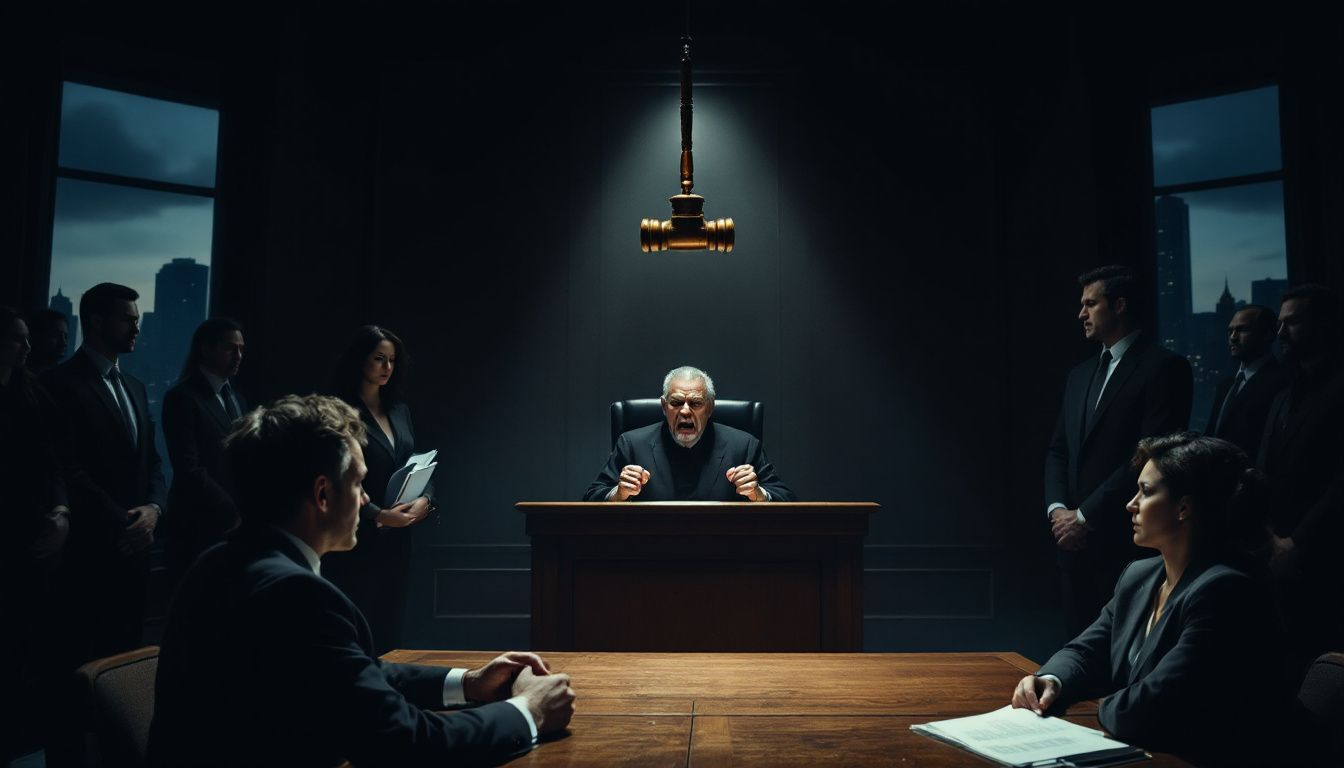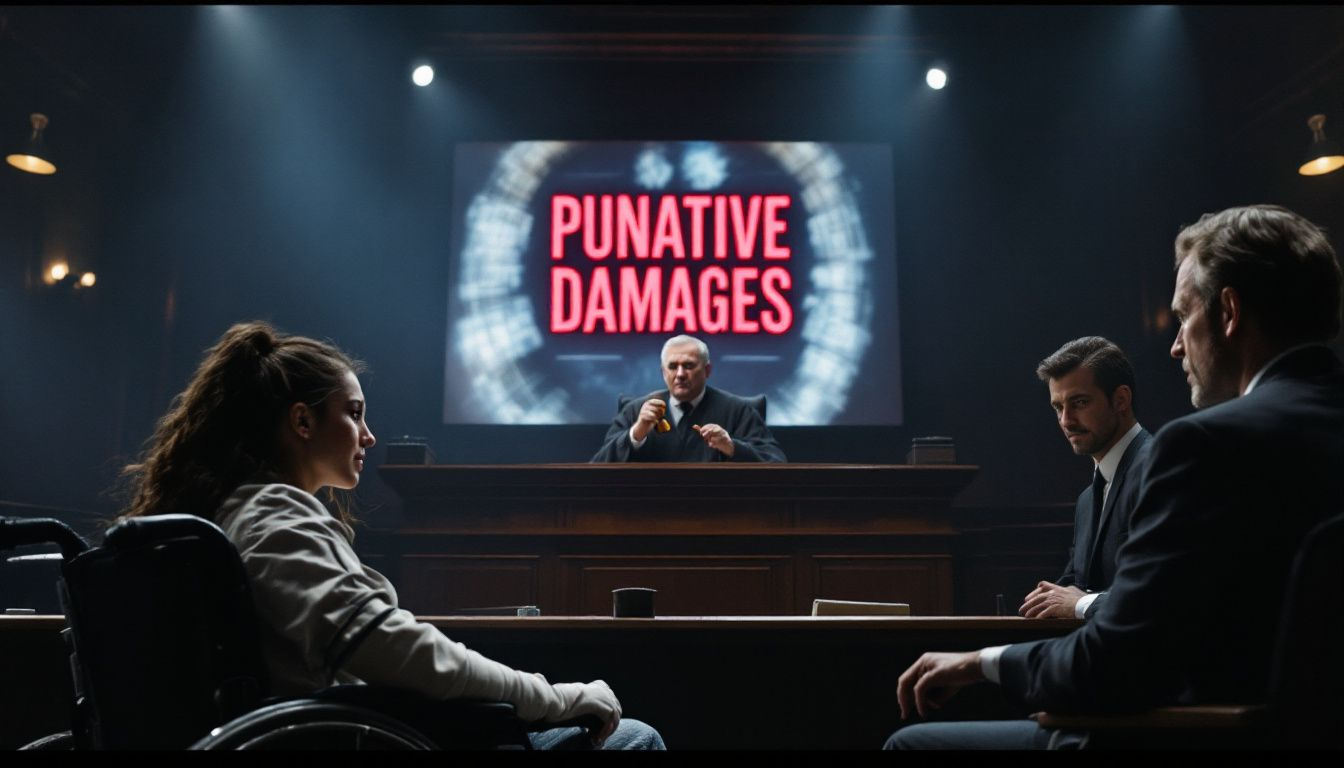A Guide to Understanding Punitive Damages in Personal Injury Cases
Punitive damages in personal injury cases are designed to punish the defendant for particularly egregious conduct and to discourage similar behavior (from other potential defendants) in the future. Unlike compensatory damages, which aim to restore the victim’s losses, punitive damages focus on penalizing the wrongdoer — the intention is not to give the victim a financial windfall, even though in practice that is what happens. This article will guide you through how punitive damages work, when they can be awarded, and the factors influencing their calculation.
Key Takeaways
- Punitive damages are intended to punish defendants for egregious behavior and deter future misconduct, differing significantly from compensatory damages that aim to restore the victim’s pre-injury condition.
- The awarding of punitive damages is influenced by factors such as the nature of the defendant’s conduct, their financial condition, and the extent of harm inflicted on the plaintiff.
- Punitive damages are subject to statutory limits that vary by state, ensuring they remain proportional to compensatory damages and the severity of the defendant’s actions.
What Are Punitive Damages?

Punitive damages are designed to serve as a punishment for the defendant in civil litigation and act as a deterrent against similar future actions. These damages are distinct from compensatory damages, which aim solely to return victims to their position prior to injury. Instead, punitive damages awards are levied specifically for conduct that is considered exceptionally offensive and reprehensible, with the intention of preventing others from engaging in comparable behavior.
These punitive damage measures fulfill an important function within society by clearly communicating that certain types of misconduct will face severe consequences. For example, when awarded in cases of drunk driving, they not only provide restitution for those harmed but also serve as a strong societal denunciation aimed at curbing such perilous activities among the broader public.
In situations where gross negligence or intentional wrongdoing occurs—or there exists a blatant indifference towards safety—punitive damages may be warranted. The offender’s actions must display especially outrageous behavior. This could include deliberately selling dangerous items without adequate warnings or habitually flouting established safety protocols. Punitive damages rulings seek out behaviors far more grave than simple carelessness: these acts involve profound malevolence or extreme recklessness.
Differences Between Compensatory and Punitive Damages
It’s essential to understand the difference between compensatory and punitive damages in the context of personal injury cases. The purpose of compensatory damages is to reimburse for specific losses incurred, such as medical bills, lost earnings due to inability to work, and property destruction. These are intended not only for economic restitution but also address non-economic repercussions with an aim to return victims back as closely as possible to their situation prior to injury.
In contrast, punitive damages are imposed in order specifically to reprimand severe or intentionally harmful actions by a defendant and act as a deterrent against similar conduct going forward. They do not cater directly toward remedying the victim’s hardships. Rather they concentrate on discouraging others from indulging in such reprehensible acts through additional financial penalties.
There can be instances where both types of damages might be applicable simultaneously — should it be determined that a defendant acted with gross negligence or disregard. Under these circumstances, courts may award compensatory damages compensation for actual harm suffered by the plaintiff along with punitive charges designed explicitly for punishing defendants more sternly than mere compensation would entail. This strategy ensures comprehensive fiscal assistance is provided while simultaneously imposing stricter liability upon those who have committed wrongdoing.
When Can You Seek Punitive Damages in Personal Injury Cases?
Punitive damages are sometimes awarded in cases of particularly egregious conduct, but they aren’t common in most personal injury claims. To secure a punitive damages award, plaintiffs must demonstrate that the defendant’s actions were either malicious, intentional or grossly negligent – conditions ensuring that such awards are reserved for instances where compensatory damages don’t fully address the severity of the wrongdoing.
Importantly, the judge has full discretion on whether to award punitive damages. Just because you show that the defendant’s actions were egregious does not necessarily mean that the judge will award punitive damages.
Circumstances like illegal street racing and reckless drunk driving could prompt a court to award punitive damages. For example, if an individual with prior warnings and offenses causes a major accident while intoxicated, they may face punitive damages as punishment for their actions and as a deterrent against similar future behavior.
In product liability disputes when companies willfully sell dangerous items without adequate warnings causing severe harm, courts might also assign punitive penalties. These punishments serve to chastise businesses for their indifference toward consumer safety and discourage comparable neglectful practices from recurring within industry standards.
Additional situations include premises liability issues wherein known dangers aren’t addressed leading to significant injuries or corporate irresponsibility exemplified by employing drivers who have records of accidents or reckless tendencies. Such examples underline the significance of enforcing responsibility upon defendants whose conduct gravely endangers public welfare.
Factors Influencing the Awarding of Punitive Damages
In personal injury cases, the decision to award punitive damages is contingent on a multitude of considerations. Central to this determination is the character of the defendant’s actions. The court is more inclined to impose punitive damages when it finds that these actions are intentional, spiteful, or demonstrate extreme carelessness. This inclination increases as they evaluate how reprehensible the conduct is.
When considering awarding punitive damages in personal injury litigation, a key factor at play is the financial status of the defendant. Courts take into account both income and assets belonging to defendants so as to assign punitive damages that have enough weight for deterrence purposes. Ensuring that those with greater wealth cannot simply dismiss such penalties due to their economic advantage makes this assessment pivotal.
Nature of Defendant’s Conduct
Punitive damages are often imposed when behavior is extremely objectionable, such as willful, malicious, or reckless actions. A defendant who deliberately puts others at risk by exhibiting gross negligence or intentional misconduct may be subject to punitive damages. In evaluating the conduct’s severity, the jury takes into account aspects like intent to harm, deception, mistreatment, or blatant indifference.
The financial condition of the defendant plays a role in determining the punitive damages awarded. The courts aim to make sure that these fines have enough weight to discourage repeat offenses and that they proportionately penalize wrongdoing irrespective of how wealthy the defendant might be.
Degree of Blameworthiness
Punitive damages are more likely to be awarded when the defendant’s behavior is deemed highly blameworthy or morally reprehensible. The worse the conduct, the greater chance there is that punitive damages will be imposed to ensure those who engage in egregious actions receive punishment proportionate to their behavior.
Conduct considered extremely blameworthy can range from gross negligence to deliberate harm. A company consciously marketing hazardous products without adequate warnings, or a person who continuously operates a vehicle while intoxicated despite awareness of the dangers, exemplifies conduct of significant moral turpitude and may trigger an award for punitive damages.
Harm to Plaintiff
The degree of damage suffered by the plaintiff plays a pivotal role in determining the sum of punitive damages awarded. In cases involving personal injury, both the intensity and ramifications of the harm are critical factors in considering whether punitive damages should be imposed. A direct correlation exists between increased severity and impact on an individual’s life with a higher probability that punitive damages will be levied.
Specifically, when significant physical harm occurs, for example from traumatic brain injuries or profound emotional distress, there is an elevated chance that punitive damages may be granted. The courts take into account the extent to which harm has been inflicted as they aim to ensure that any awarded punitive damages appropriately mirror just how grievous the defendant’s actions were and their subsequent effect on the victim’s well-being.
Examples of Punitive Damages in Personal Injury Cases

Illustrative cases demonstrate the application of punitive damages within the context of personal injury lawsuits. For instance, if a trucking business knowingly employs drivers with records of accidents or reckless behavior, this could constitute gross negligence. In response to such irresponsibility, courts are empowered to impose both punitive and exemplary damages as a form of punishment and deterrence against future misconduct by the company.
Consider also an incident where an intoxicated motorist causes a significant vehicular collision leading to serious injuries like fractures or traumatic brain damage. Here, judicial authorities have recourse to assign punitive damages in order to reprimand the driver for their dangerously careless actions while simultaneously broadcasting a robust deterrent message regarding driving under the influence.
The Sandy Hook litigation illustrates how punitive damages can be applied. Decisions related to these awards are currently subject to scrutiny at an appellate level.
How Are Punitive Damages Calculated?
The process of determining punitive damages takes into account various elements, with considerable latitude given to the decision-makers. The gravity of the defendant’s actions and the importance of discouraging similar behavior in the future are key considerations for juries when they assign a value that may surpass compensatory damages as an expression of the seriousness of the misconduct.
In establishing this sum, it is vital to evaluate how much wealth the defendant has. This helps ensure that any punishment imposed is substantial enough to function as an effective preventive measure irrespective of their financial resources. Typically, calculating these punitive damages involves multiplying original compensatory damages amounts by a factor, which can be up to sevenfold higher than those initial compensatory figures.
The Role of Evidence in Pursuing Punitive Damages
The pursuit of punitive damages rests upon the robustness and pertinence of evidence brought forward. Crucial pieces of evidence include medical records, testimonies from witnesses, visual proof from video footage or photographs, as well as specialist opinions that help to substantiate the negligent behavior of the defendant. When dealing with instances involving fraud or deliberate misdeeds, it is imperative to produce clear and convincing proof that deceit has led to harm in order to forge a persuasive argument.
Legal representatives are pivotal in accumulating and showcasing this evidence. They might issue subpoenas for text messages, phone logs, and additional documentation necessary to establish the responsibility of the defendant. Their expert legal acumen aids in evaluating how probable it is that punitive damages will be granted based on unique case details. It is vital for this collection and delivery process regarding evidence to be meticulous so courts can be swayed toward awarding punitive damages.
Achieving success with claims related directly to punitive measures hinges on producing compelling demonstrations of wrongful actions committed by defendants. This highlights why adopting a comprehensive and carefully designed strategy when constructing an argument for these types of sanctions becomes essential — not only does it ensure justice prevails, but also helps inhibit any potential future infractions similar in nature.
Legal Assistance for Punitive Damages Claims
Delving into the complexities of the legal system can seem overwhelming, particularly when one aims to seek punitive damages within a personal injury lawsuit. The task of gathering adequate evidence to substantiate claims requires expertise and diligence. In such instances, personal injury lawyers are indispensable allies in assembling and articulating proof that demonstrates the defendant’s flagrant misconduct.
For those in need of legal guidance, contact 1-800-THE-LAW2. Our helpline connects callers to attorneys who can provide free consultations. These complimentary consultations with personal injury attorneys are critical in evaluating the case at large, as well as the potential availability of punitive damages. With professional legal backing, individuals are empowered to maneuver through judicial processes and pursue rightful compensation effectively.
Statutory Limits on Punitive Damages

States enforce varying statutory limitations on punitive damages, often restricting them to less than tenfold the compensatory damages. These state-specific ceilings are designed to curb disproportionately high punitive damages awards. In Texas, for example, the law restricts punitive damages to double the economic loss with an additional limit of $750,000 for noneconomic losses or alternatively a minimum threshold of $200,000—whichever sum is greater.
The constraints imposed by states differ. Take Florida as another case where caps may be established at three times the value of compensatory damages or a fixed ceiling of $500,000—again contingent on whichever is higher.
As per guidelines from the U.S. Supreme Court regarding proportionality in such matters, ratios that elevate punitive damage amounts into double digits relative to compensatory ones can be flagged as exorbitant. The intent behind these regulations is twofold: maintaining a reasonable balance between remedying harm and penalizing wrongful conduct through financial compensation while ensuring alignment with both suffered injuries and accountable behavior.
Tax Implications of Punitive Damages
Plaintiffs must be aware of the tax consequences associated with punitive damages. The IRS mandates that any punitive damages received from legal actions must be taxed as regular income, regardless of whether or not the accompanying compensatory damages are exempt from taxes. According to Section 104 of the U.S. tax code, although compensatory damages linked to personal physical harm are non-taxable, there is a requirement for taxation on all punitive damages.
Following the enactment of the Tax Cuts and Jobs Act in 2017, plaintiffs can no longer deduct legal expenses related to pursuing punitive damages claims against their taxable income. This change leads to an increased financial burden in terms of taxes owed by these individuals. Employing a Plaintiff Recovery. Trust as part of one’s tax strategy could alleviate some fiscal strain. This mechanism ensures that plaintiffs pay taxes solely on net proceeds received after accounting for attorney fees.
Engaging in diligent tax planning is essential when dealing with potential sizable tax liabilities stemming from being awarded punitive damages – this holds even greater importance if you find yourself having to pay such penalties out-of-pocket.
Summary
In essence, punitive damages are a critical component within the sphere of law that aims to both punish and dissuade flagrant wrongdoing. They come into play when a defendant’s actions are exceptionally harmful, deliberate, or show a high degree of negligence. Knowledge about what influences the assignment of punitive damages—including how reprehensible the defendant’s behavior was, their level of culpability, and the extent of the injury suffered by the plaintiff—is important for individuals embroiled in personal injury disputes.
Victims suffering from severe wrongdoings stand to increase their potential recovery significantly by seeking punitive damages which act as an amplified disincentive against similar misdeeds in future occurrences. For those entangled in such distressing circumstances, it is imperative to seek expert legal counsel. Justice goes beyond mere reparation. Its purpose extends towards confronting and deterring injurious conduct effectively. Engaging with skilled professionals like those at 1-800-THE-LAW2 can be instrumental in your quest for rightful redressal.
Frequently Asked Questions
What are special damages in personal injury claims?
Special damages in personal injury claims refer to specific, quantifiable costs incurred by the victim due to the injury, such as medical expenses and lost wages.
These damages can be precisely calculated and are critical for establishing the financial impact of the incident.
What are punitive damages in a personal injury case?
In a personal injury case, punitive damages are meted out as a penalty for the defendant’s exceptionally injurious actions. Their purpose is not only to punish but also to discourage the defendant and others from engaging in such conduct again. The court may decide to award these damages if it finds that the defendant acted with reckless indifference towards other people’s rights and well-being.
What are punitive damages?
Punitive damages are designed to hold the defendant accountable for their egregious conduct, providing a punishment for their actions and deterring them and others from repeating such behavior in the future. These damages are not meant as compensation for the victim, but rather to enforce responsibility.
How are punitive damages different from compensatory damages?
Punitive damages differ from compensatory damages in that compensatory damages are intended to cover actual losses incurred by the plaintiff, while punitive damages serve to punish the defendant and deter future misconduct.
When can punitive damages be sought in personal injury cases?
Punitive damages may be sought in personal injury cases when the defendant’s actions are exceptionally egregious, malicious, or grossly negligent, such as instances of illegal street racing or drunk driving.
This ensures that particularly harmful behaviors are addressed appropriately.




